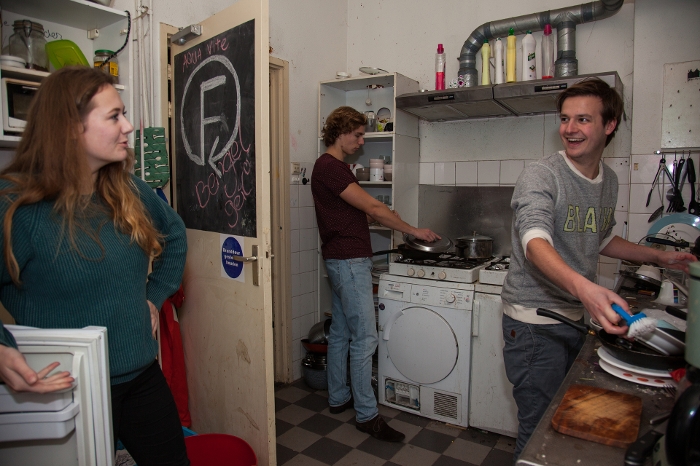
'Refrigerators are real energy consumers'
On 10 Friday, 'Warm Sweater Day', the central heating in University buildings was set a few degrees lower. Those who are not so warm-blooded could take comfort knowing that there are students who are deliberately keeping the heating turned down the whole winter.
It's cold and dark in Olivier ter Meulen's room (22, student of Political Science). An empty fridge stands unplugged and with its door open. 'We have several fridges in our own rooms - and we've managed to switch two of them off by dividing the contents over the other fridges. They are real energy eaters!'
Competition
Ter Meulen and his housemates are taking part in the Student Energy Race, organised by student housing agency DUWO. The students are challenged to save as much energy as possible during the cold season from November to March. This year, 120 students from four cities - Leiden, Delft, The Hague and Deventer - are taking part in the competition. Mick Weggemans from DUWO reports that the house that has saved most energy will win the top prize: 'But we're keeping it a secret what the prize is!'
Double glazing
DUWO's aim with the competition is to make students more aware of their energy use. Weggemans: ‘There's a limit to the technical modifications we can make so that student houses are more energy efficient. Awareness is also important.' He mentioned double glazing as an example. 'If you leave the window open all day, the double glazing has no effect.'
Change in behaviour
The student houses taking part have so far made a saving of fifty per cent in their energy usage, according to Weggemans. 'That's an enormous saving that you can't achieve with just technical modifications.' Weggemans hopes that the race will bring about a permanent change in the students' behaviour. 'The houses taking part all have a workshop on sustainability beforehand. And, of course, it's great that students share what they have learned with others.'
Environment
You might think that the environment also benefits, but a better planet isn't neccessarily in everyone's mind. Ter Meulen: ‘The biggest stimulus is financial. We all live together here and at the end of the year DUWO works out how much energy we've used. If we've used less than DUWO has charged us, we get the difference back.'

Simple measures
Whatever the motivation, with just a couple of minor changes you can already save a lot of energy, according to Ter Meulen. 'Taking only short showers, switching off equipment you're not using, turning off the lights and heating when you go out, and similar things. By applying very simple measures, we have so far saved 30 per cent compared to the past few years. I don't know how the other student houses are making their savings, but we don't intend to sit in the cold all day and nor are we limiting our showers to just a minute!'
Team performance
Ter Meulen explained that taking part in the race is first of all a team performance. 'All of us living in the house are in it together. We share the kitchen and if someone leaves the light or the heating on, we all feel called upon to switch it off. Now we're even telling one another off about it.' Ter Meulen wants to encourage other student houses to take part next year. With very little effort you can make big savings.' Everyone's interested in the financial element,' says Ter Meulen. 'And it's great that the environment also benefits, if that's what's important to you.'
Tips for student houses
How to save energy? Think about these ideas:
- Check your window frames and fill in any cracks.
- Not using a piece of equipment? Switch it off and unplug it.
- Take a critical look at the equipment in the shared kitchen or living room. Do you need all those fridges?
- An easy one: put the heating a degree lower and wear a warm jumper.
- Cook with lids on the pans and don't put the gas or ring any higher than you need to.
- Spend less time in the shower. Put an egg timer in the shower to remind you.
- Only boil enough water in the kettle for what you need. You can also put a thermos flask next to the kettle and put any left-over hot water in it.
- Another good tip: replace old electric light bulbs with energy-saving lamps.
- Put radiator foil against the wall behind the heating to stop the heat disappearing through the wall.
